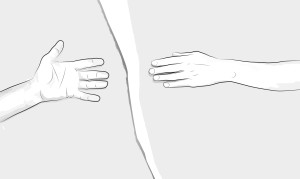I was asked to assemble a service for Beacon Unitarian. I accepted and decided to meet several constraints, some of which are mentioned below.
As I said in my last post, I am trying to relate (a) acceptance and commitment therapy/training to (b) H-CogAff (a theory of affect). This is to better understand mental phenomena and to develop new solutions that promote well-being and cognitive productivity (including “meta-effectiveness”, the skills and propensity to use knowledge to become more effective.)
So, I decided to create a service entitled Emotion as Perturbance: A Draft of ACT in Three Acts to informally present the perturbance theory of emotion in combination with acceptance and commitment therapy/training and the work of Jacques Brel. That allowed me to pursue several CogZest projects in one Zest of Brel production.
There are a few triads in this service, including the following:
- Jackie Rides Her Emotion Machine (a short story for the young and young at heart),
- If Not Now, Then … (a short story with many of the same basic ideas, but for the adults; it’s about Lebel who falls in love with Marieke, but …),
- Accepting Emotional Perturbance and Moving On (a presentation on the subject).
“Hands Torn”
(By Laura Redmond of Retro Metro, Inc.)
To support the second story, I wove through the service four of Arnold Johnston’s translations of Brel’s songs:
- Orly video, here; French lyrics, here (A heart wrenching song about a couple parting at a train station, the man going off—to war?—presumably, never to return.)
- Voir un Ami Pleurer video; French lyrics, here. Translated as “To See a Friend in Tears”. (How, of course, we must endure all kinds of suffering; but, to see a friend in tears… )
- Marieke video, here; French and Flemish lyrics, here. (A man looks back nostalgically at the period in his life when he would regularly travel from Bruges to meet his lover in Ghent.)
- Mathilde video, here; French lyrics. (A man prepares for the arrival of his former lover as a house guest. He begs his mother, maid and friends to keep her at bay. But then has a “change” of heart… )
Sue Sparlin read the first two songs and sung the others. She was accompanied by David Hamilton, Beacon’s pianist. During the meditation David played one of his favourite songs, Brel’s pensive Fils De…. Unfortunately, the piano doesn’t come through loudly enough in the recording.
Here’s an edited recording of the service. I had to remove a few elements (such as the acceptance meditation), which harshly breaks the flow of what was a very fluid service. Sorry.
If the embedded player above doesn’t work for you, download the audio file (click the link to save the file and play it locally).
Jacques Brel captured the complexity and essence of emotional experience, hope and despair, in a manner that is normally misunderstood, and too complex to capture here. Let it be noted that he often portrays denial in acceptance. Acceptance is not as easy as it may seem. Thus, ACT is not a simple act. Whether or not they have an explicit theory of perturbance, song writers like Brel, David Francey and Stan Rogers, certainly grasp and convey the concept.
Brel was reluctant to refer to songwriting as an art because he felt it was subject to too many constraints, not the least of which is its minuscule temporal footprint—three minutes. I empathize! I found it difficult to convey the admittedly complex message I aimed to share within my allotted 30 minutes. An important element that was lost in the service is the distinction between accepting “thoughts” and accepting feelings. For one thing, cognition and affect are oft impossible to separate (as I argued in Cognitive Productivity). ACT offers techniques for cognitive defusion, i.e., to treat mental content as non-factual—neither true nor false. (Compare J. L. Austin’s How to Do Things With Words, and Chapter 2 of Sloman’s Computer Revolution in Philosophy.) It offers equally important techniques for accepting affect, such as body scan (“surfing”), deliberate breathing and “expansion”. I only vaguely alluded to the latter. Russ Harris’s The Happiness Trap presents the concepts and techniques clearly and simply.
Acknowledgments
I’d like to thank poet, author and professor Arnie Johnston for granting me permission to use his translations of Jacques Brel’s work. Here is a video of Arnie discussing and presenting one of his Brel translations.. He aims to produce better translations of Jacques Brel than those found in Jacques Brel Is Alive and Well and Living in Paris. He has succeeded and he continues to perfect his work — it’s a tremendously demanding project. Some of Arnie’s work is available on Amazon.
Jacques Brel’s work is available in many stores including iTunes and Amazon.
Thanks also to Sue Sparlin (singer, reciter), David Hamilton (pianist), Laura Redmond (visual artist), and Joan Morris (coordinator).
Laura Redmond used the stories and presentation materials to develop lessons on emotion for her young students.


2 thoughts on “Emotion as Perturbance, Draft of ACT in Three Acts (Performed)”